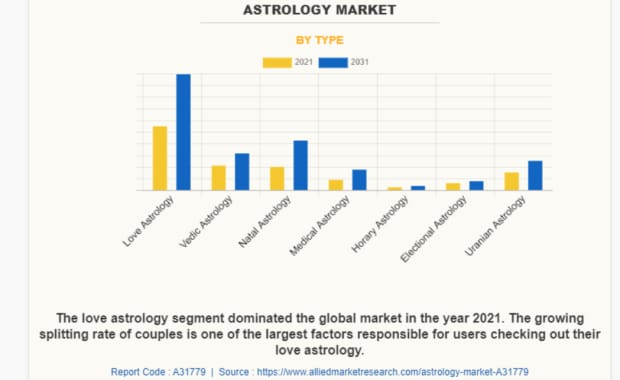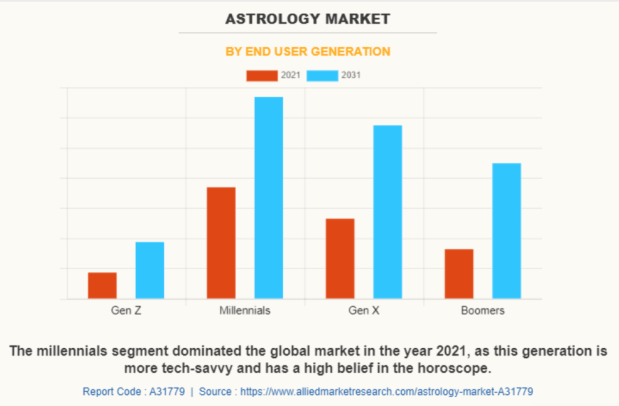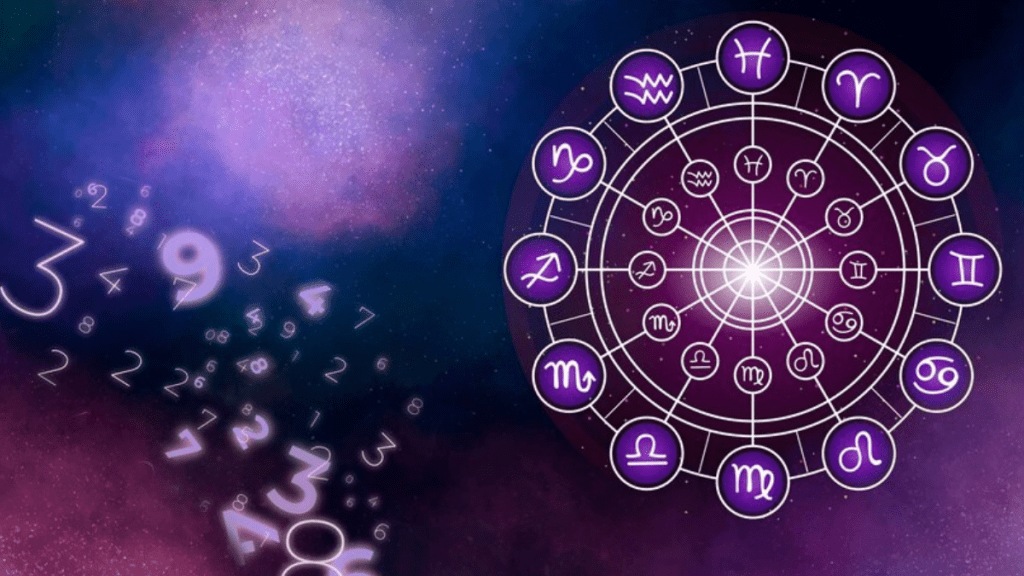It all started with astrology and went onto tarot card readings, and numerology, among others. Today social media platforms are flooded with professionals who can not only change the course of your life, from what it seems, as claimed by the lot ‘make or break’ your life. From Astrotalk to Astroyogi, ClickAstro, InstaAstro, and Astrosage are some of the products which have found a place in the lives of millennials. Not to mention then there are famous personalities such as Sanjay B Jumani, and MastishkaabyKavitaOjha, to name a few. “The astrology app business is a potential multi-bagger business of the future. Its potential is endless. As uncertainty grips people’s lives, people want to peek into the past, the present and the future—more and more,” Harish Bijoor, business and brand strategy specialist and founder, Harish Bijoor Consults Inc, told BrandWagon Online.
The global astrology market which was valued at $12.8 billion in 2021 is projected to reach $22.8 billion by 2031, growing at a CAGR of 5.7% from 2022 to 2031, as per Allied Market Research – a research agency. The report further stated that the industry witnessed a boom in its growth due to the pandemic as people were curious about their future. Searches for ‘birth chart’ and ‘astrology’ reached a five-year high last year, according to Google Trends.
Queries sent to Astrotalk and ClickAstro remained unanswered, till the time of publishing this story.
Game of name!
Astrology apps, whether accessed via websites or mobile applications, typically prompt users to provide details such as date of birth, name, and place of birth. Most astrology apps offer a free basic analysis with limited information, then prompt users to purchase the full report for more in-depth insights. The cost of these birth chart reading reports ranges from Rs 500 to Rs 2,500, depending on difference. For instance, ClickAstro’s Birth chart reading report is priced at Rs 999, with occasional offers and discounts available while their ‘future book’ costs Rs 2500. “We have 5 5-day daily pass for new users after taking Rs 1 offer. This plan comes in Rs 99. The new customer has the option to experience the platform with a discounted offers.
We have our website which has all astrological content. We also have social channels which has huge engagement. Our referral program which gives Rs 400 to customer for every purchased customer is very hit. We also run ads on Facebook, google and other platforms,” Nitin Verma, founder, InstaAstro, said.
Apart from this, a common revenue model for these apps is to act as a platform for astrologers, earning a commission for each consultation. These apps host thousands of registered astrologers, and users typically recharge their wallets to pay for minutes when speaking with an astrologer. The consultation charges vary widely across applications and depend on the popularity of the astrologer, ranging from Rs five per minute to Rs 100 per minute. Typically, to attract users, astrology apps offer a complimentary four to five-minute chat session with an astrologer upon the first login. “ We’ve been running this business for 24 years now, starting as the first in the market back in 2001. What I can confirm is that the need for astro-tech has always existed; people have always been curious about the future. This increased interest isn’t just due to novelty but also because access to a younger audience has grown. This trend isn’t unique to astro-tech but applies to all businesses. I would say the turning point was the introduction of UPI (User payment interface) into the market, coupled with the widespread adoption of UPI and increased Internet penetration around 2017, thanks to Jio. These factors have significantly expanded the Gen Z user base for astro-tech,” Aditya Kapoor, COO, Astroyogi, said.

Experts believe that astrology apps, with their online accessibility through chats and calls, offer consultations that can be accessed anytime and anywhere, fitting into modern busy lifestyles. “These applications’ affordable pricing models make professional astrology services accessible to a broad audience, democratising the practice and increasing its appeal and reach. This blend of privacy, convenience, and affordability has propelled the adoption of astrology apps significantly,” Jignesh Maniar, founder, Onads Communications and Mediaqart, said.
The rise of these apps is visible via the kind of funding they have managed to score and thanks to the inflow of money by consumers, a few have also become profitable.
Sample this: Astrotalk raised funding in April 2024 of $14 million led by Elev8 Venture Partners. The company’s revenue from operations rose 2.46 times to Rs 283.3 crore in FY23 from Rs 115.36 in FY22, as per regulatory filings assessed by business intelligence firm Tofler. It posted a 54.83% increase in net profit to Rs 8.47 crore in FY23 from Rs 5.47 crore in FY22. As per several media reports, the company plans to expand into the US, UK, Canada, and West Asia, with 20% revenue from international markets. Similarly, InstaAstro raised $2.30 million in pre-series A led by Artha Venture Fund.
One of the top brands in the business, Astroyogi’s total revenue rose 35.18 to Rs 68.95% in FY23 from Rs 51.01 in FY22. It posted a net profit of 1.71 crore in FY23 from a net loss of Rs 40 lakh in FY22. As per several media reports, the company is in talks to raise fresh funds from investors.
“One of the primary factors influencing our decision to invest in the astrology app market is its deep-rooted presence in Indian culture. Astrology is an age-old art intrinsically woven into the fabric of Indian life. However, the ecosystem has long been fragmented and marred by trust issues due to unverified practitioners who overcharge customers,” Anirudh A Damani, managing partner, Artha Venture Fund, which invested in InstaAstro, said.
Experts believe that the growing interest among millennials and GenZs to understand their future through methods such as Vedic astrology, numerology, or Chinese astrology has fueled growth in this sector, making these businesses both profitable and widely accessible.“About 25 to 30% of our users are Gen-Z, specifically in the 18 to 24 age group. The remaining 60% of our users are older than this group, making up the rest of our user base. So far, we have targeted audiences in tier-1 and metros. As we expand into tier-2 and tier-3 cities, we anticipate larger contributions from these areas, as we know there is significant potential there,” Kapoor added.
Industry experts say that Gen-Z and millennials are leading the surge in online astrology. “Together they comprise more than 85% of all online astrology services. Gen-Z are more cost-sensitive to cost and most question in relationship and early career,” Verma said.

Marketing luck!
Experts believe that targeted advertising has played a crucial role in engaging users as well as potential users. With the display of ads when users search for solutions to issues like career dilemmas or relationship problems, these apps generate curiosity through repeated exposure. This curiosity often leads users to try these apps, where they typically are satisfied with answers and subsequently spread the word through word-of-mouth. “Measuring the effectiveness and ROI of social media and influencer marketing can be done by tracking engagement rates, conversion rates and cost per acquisition (CPA) using tools like Google Analytics and social media analytics in conjunction with Facebook and Google Ad managers for ad performance reports, while comparing these metrics to traditional advertising’s reach, brand recall and return on ad spend (ROAS),” Maniar said.
Industry experts opined that social media enabled brands to target users based on their interests and content consumption, allowing marketers to test personalised communication with different audience segments. Re-marketing is crucial in converting customers by offering monetary or non-monetary incentives. Influencer partnerships and user-generated content help companies reach younger audiences and boost credibility in astrology services. “There are over 100,000 astrologers in India, many of whom struggle to make a decent living. These platforms provide them access to a global customer base without requiring substantial technical investments, allowing them to earn a respectable income from their hometowns,” Damani said.
Interestingly, a few experts stated that the commercialisation of this process has led to the rise of scams and frauds. “These applications are scams, exploiting people’s emotions through advertising and marketing with questions like ‘When will my ex come back?’ or ‘Will I marry my current boyfriend?’ They offer a four-minute free call, but as an astrologer, it is impossible to predict or calculate in such a short time. These apps mainly target the 15-20 age group and often provide random information,” Nikita Jain, who claims to be an astrologer with Astrotalk and is currently working with Astrosage, said.
Many believe that this is also now over-crowded, leading to a drop in quality. Due to the presence of thousands of astrologers online, the quality of their qualifications and accuracy seems to be questionable. “The downside is that the immense potential of astrology apps will attract unqualified and unprofessional individuals. This could lead to astrology being seen as nothing more than pseudoscience,” Bijoor opined.

